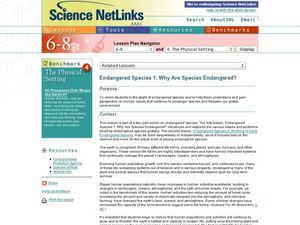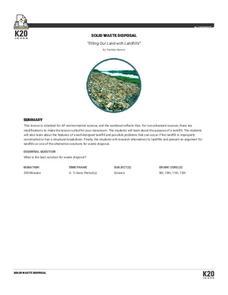CK-12 Foundation
Limiting Factors to Population Growth: Graphing Population Growth
If any of the limiting factors in an environment change, both animal and plant populations also change. The video explains two different models of growth and the impact of limiting factors. It highlights the carrying capacity of an...
Curated OER
Human Populations Studies: the Ghost of Populations Past
Students compile data on population distribution and develop survivorship curves using information from cemetery tombstones and obituaries. They develop inferences on the changes in population age distribution in their area over time.
National Geographic
Genetic Markers: Connecting the Dots
Biology buffs simulate how genetic markers are passed among populations in order to understand how these markers can help anthropologists map human migration. A couple of volunteers leave the room while you walk the remaining learners...
Curated OER
The Human Footprint
In this environmental stewardship lesson, students view the human footprint website and then answer 3 short answer questions related to human impact on the earth.
Curated OER
Industrialization, Chemicals and Human Health - Math
Students review the units of the metric system, and practice estimating measures before actually converting between the two systems of measurement. They participate in activities to visualize a concentration of one part per million....
Curated OER
Endangered Species 1: Why are Species Endangered?
Emerging ecologists examine endangered species by visiting the US Environmental Protection Agency website. They consider human contribution to the decline of different species. They research an endangered animal and then craft a poster...
Curated OER
Human Footprint
Students study facts about humans and how they are impacting the Earth. In this investigative lesson plan students help map peoples footprints over the Earth's surface and evaluate these factors.
Curated OER
Human Ecology: How it Relates to Population
Ninth graders are introduced to the concept of population. In groups, they research the problems associated with overpopulation and underpopulation. They practice calculating birth and death rates and discus how they can be used to...
Curated OER
The Ozone Between Us
Young scholars investigate how ground level ozone occurs in many areas of the country. They study the ozone problems that are associated with population centers.
Curated OER
Human Impact on the Environment
In this environmental science worksheet, students complete a crossword puzzle with 26 questions about human impact on the environment.
Curated OER
Environmental Limitations
Seventh graders study the environmental factors that affect population growth. In this biology lesson, 7th graders create a city following certain criteria. They present their posters in class.
Curated OER
Deadly Disease among Us
Students recognize that infectious diseases are a continuing problem among all human populations. They define and give examples of emerging infectious diseases. Students define and give examples of re-emerging infectious diseases.
K20 Learn
Filling Our Land with Landfills: Solid Waste Disposal
Though it comprises only 5 percent of the world's population, the US generates 40 percent of the world's waste. Scholars learn about landfills, their safety, and other solid waste methods. They use experiments and research to learn more....
Curated OER
Lesson 3: Understanding Population Growth
Young scholars explain population growth in Maryland and its relationship with age structure, household growth and consumption of land.
Curated OER
Populations – The Survival of the Fittest (Part 1)
Students explain in their own words why organisms live together. In this biology lesson, students model what happens to organisms if their environment changes. They explain the importance of evolution.
Population Connection
The Carbon Crunch
Carbon is in the air; should we care? Teach the class why it is important to pay attention to carbon levels and how the world population and various countries across the globe affect the carbon levels in the atmosphere. High schoolers...
Curated OER
The Ghost of Populations Past
Students study population distribution and survivorship curves by collecting data regarding age of death of humans from either tombstones, newspapers, or other community resources. Students analyze data by creating graphs and population...
Curated OER
Are There Too Many Elk?
Young scholars study elk populations in Arizona. In this data lesson students read an article on monitoring elk populations, analyze data and make management recommendations.
Wild BC
Is Climate Change Good for Us?
Is it really that big of a deal if the global climate undergoes a little change? Young environmentalists consider this very question as they discuss in small groups the impact of different climate change scenarios on their lives,...
Curated OER
The State of the Planet
Students address four different environmental topics (water issues, the threat of food shortages, human population growth, and global warming) as they watch a film and discuss the future of the earth. In groups, they complete various...
Curated OER
Patterns of Evolution and Selection
Can your young biologists interpret population graphs, match macroevolution patterns and descriptions, and answer multiple choice questions about evolution? Find out with a comprehensive three-page quiz covering some specific examples of...
Curated OER
Why Care About Amphibian Population Decline and Malformations?
Young scholars examine the reasons for preserving wildlife. They look at reasons for amphibian malformations and write an essay about the ethical issues that this brings up. They listen to the teacher read quotes about extinction and how...
Curated OER
You Need How Much Food When? Where?
Ninth graders explore how human activities shape the earth's surface. In this awareness instructional activity, 9th graders create pictographs showing the relations of food, people, land, and resources. Students complete worksheet.
Curated OER
A Tree Is More than a Street Name
Eighth graders discuss the role of trees as one of the most important natural resources. In groups, they examine how the forests nearby helped to shape their urban city. Using the internet, they research the use of the forest in early...























